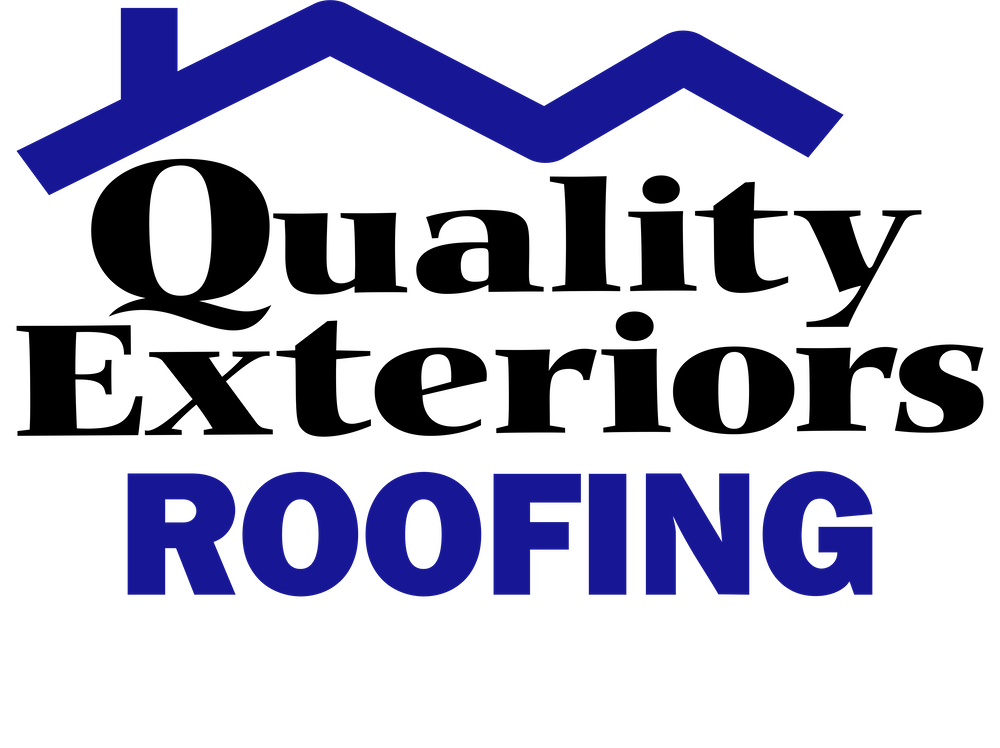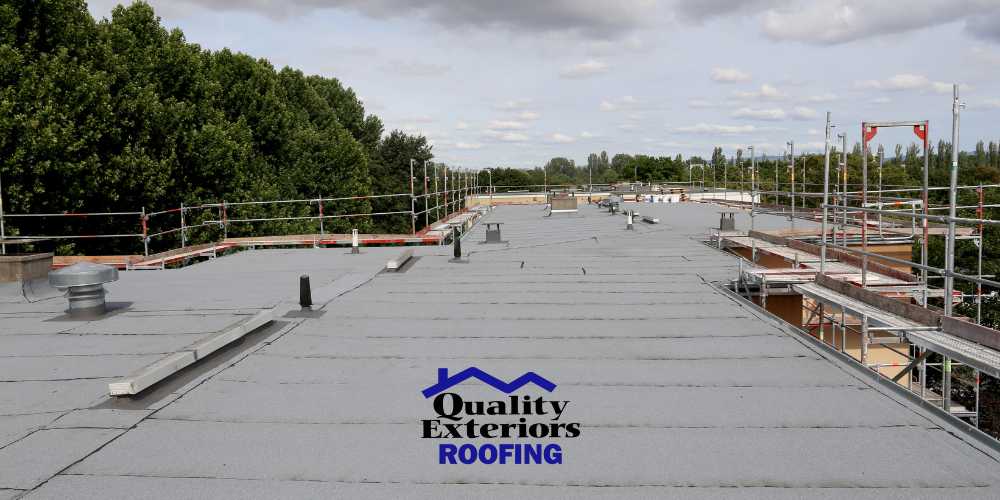When it comes to selecting materials for flat roofing, several options are available. From traditional to modern, the choice of flat roof materials plays a crucial role in the durability, performance, and longevity of flat roofs. For expert guidance and top-quality flat roofing materials, contact the professionals at Quality Exteriors Roofing today. Our experienced team specializes in providing durable, reliable, and long-lasting flat roofing installations and flat roof repair in Bossier City.
Contact us now to schedule a consultation and experience the difference of working with a trusted leader in flat roof systems. Call (318) 747-1254 or complete our online form to request a free roof inspection in Bossier City, LA.
Flat Roof Types
There are many types of flat roofs that offer versatility and durability. Those owning commercial properties typically have questions regarding the unique features and advantages offered by different flat roof types or flat roof materials.
The roofing professional team at QEI explains the unique features and advantages offered by different types of flat roofs and flat roofing materials for commercial buildings.
The most popular flat roof types for commercial buildings include:
- Single-Ply Membrane Roof
- Built-Up Roofs (BUR)
- Modified Bitumen Roofing
- Spray Polyurethane Foam (SPF) Roofing
- Green Roof
- Metal Roofs
- Flat Roofs With Asphalt Shingles
These types of flat roofs offer various advantages, such as durability, providing insulation, and sustainability, catering to different commercial building needs.
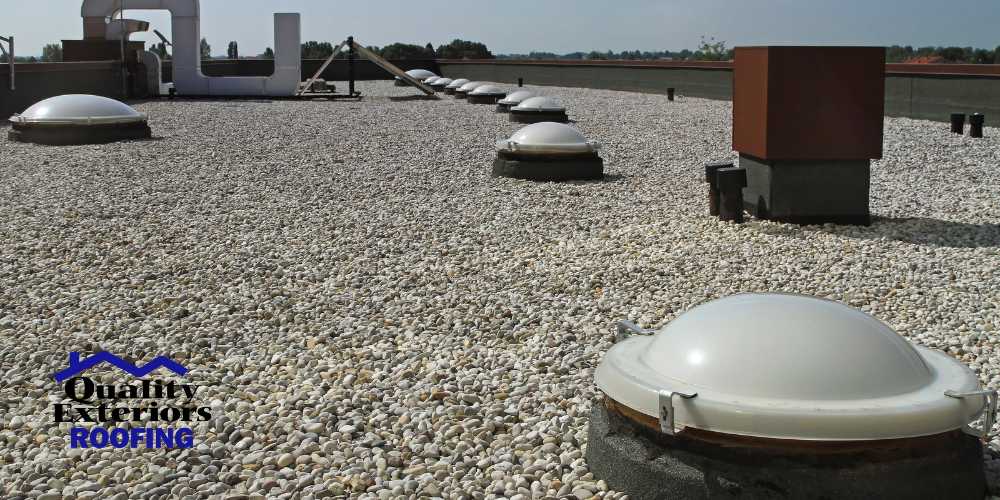
Common Types of Flat Roof Materials
Exploring the realm of flat roof materials reveals a diverse array of options suited to various needs and preferences. From time-tested choices like built-up roofs (BUR) and modified bitumen roofs to contemporary solutions such as EPDM roofing, single-ply membranes like TPO and PVC, and even standing seam metal roofs, each material brings its own set of advantages and characteristics to the table.
Whether you’re considering the durability of flat roof material like modified bitumen or the versatility of single-ply membranes, understanding the nuances of these common types of flat roof materials is important for wise and sensible decision-making for your project.
Modified Bitumen Roof
Modified bitumen roofing, a single-ply rolled roof, is a type of flat roofing material that consists of asphalt-based materials modified with a mineral-based wear surface to enhance durability and flexibility. A modified bitumen roof typically comes in rolls or sheets and is normally installed using torch-down systems.
Modified bitumen roofing is known for its excellent weather resistance, UV protection, and ability to withstand temperature fluctuations. This is a popular choice for residential and commercial buildings due to its affordability and long-lasting performance.
Built-Up Roof (BUR)
Built up roofing (BUR) is a flat roofing system commonly used in commercial properties and structures with a low slope. A built up roof consists of multiple layers of roofing felt alternated with layers of hot-applied asphalt or hot tar with a top layer of aggregate, such as smooth river stone or gravel.
The layers of built-up roofs are built up to create a durable and weather-resistant roof surface. Typically, the final layer of a built-up roof is finished with gravel or a reflective coating to protect the underlying flat roofing materials from UV rays and weathering.
Built up roofs are known for strength and longevity, offering reliable protection. During the built up roof installation process, the built up roofing material is layered onto the roof surface using the hot mop method, which creates a seamless and watertight barrier on the top layer.
While traditional built up roofs use gravel for added durability, modern versions of built up roofing (BUR) may incorporate other materials like asphalt shingles or fiberglass to reduce weight.
EPDM Roofing
EPDM roofing represents a popular choice among single-ply membrane roofing systems. It is crafted from a synthetic rubber compound known for its exceptional durability and weather resistance. EPDM systems are commonly used for low-slope or flat roofs for residential and commercial buildings. Its installation typically involves laying down large sheets of the membrane, which are then adhered to the roof surface using adhesive or mechanical fasteners.
EPDM roofing boasts exceptional durability and longevity, capable of withstanding extreme temperatures, UV exposure, and harsh weather conditions without deterioration.
However, over time, shrinkage may occur with this flat roofing material, leading to issues like leaks or membrane detachment. Nonetheless, EPDM roofing remains popular for its affordability and durability as one of the top flat roof materials.
Single Ply Roofing
Single layer roofing systems are a popular choice for flat roofs due to their versatility and durability. Single-ply membrane systems consist of a single layer of flat roofing material that provides waterproofing and weather resistance.
The most common type of single ply membrane is EPDM (ethylene propylene diene monomer), which is a synthetic rubber flat roofing material material known for its excellent durability and resistance to UV radiation.
TPO roofing systems, a blend of polypropylene and ethylene-propylene rubber, offer exceptional durability against UV radiation, chemicals, and punctures, making them ideal for flat roofs. TPO roofs are favored for industrial buildings. Their reflective coating also makes them cool roofs by deflecting heat away from the structure.
Overall, single-ply membrane roofing systems offer a cost-effective and durable solution as flat roof materials, with EPDM and TPO being two popular options in the market.
TPO Roofing
TPO roofing, short for thermoplastic polyolefin, is a popular choice for commercial flat roofs due to its durability and resistance to UV radiation and chemicals. Known for flexibility and lightweight properties, TPO roofing is favored for low-slope roofs. Additionally, TPO roofs offer fire-resistant qualities, enhancing safety in commercial structures.
While TPO roofing is generally resistant to UV radiation, some formulations may be susceptible to premature aging and deterioration under prolonged exposure to intense sunlight.
TPO roofs may also be prone to punctures from sharp objects or debris, requiring regular inspections and proper maintenance to address potential vulnerabilities.
Polyvinyl Chloride Roofing
Polyvinyl chloride (PVC) roofing, a popular choice for commercial flat roofs, offers exceptional durability and resistance to UV radiation, chemicals, and punctures. Because this flat roofing material reflects heat, it lowers energy bills, while its fire-resistant qualities provide added protection for commercial buildings.
While PVC roofing is generally resistant to UV radiation, some formulations may age prematurely under prolonged sunlight exposure. Although extremely durable, PVC flat roofing materials can be costly, ranging from $4 to $7 per square foot, making them a significant investment for commercial building owners.
Despite these drawbacks, PVC roofing remains a popular choice for flat roof materials due to its durability, energy efficiency, and fire protection.
Standing Seam Metal Roof
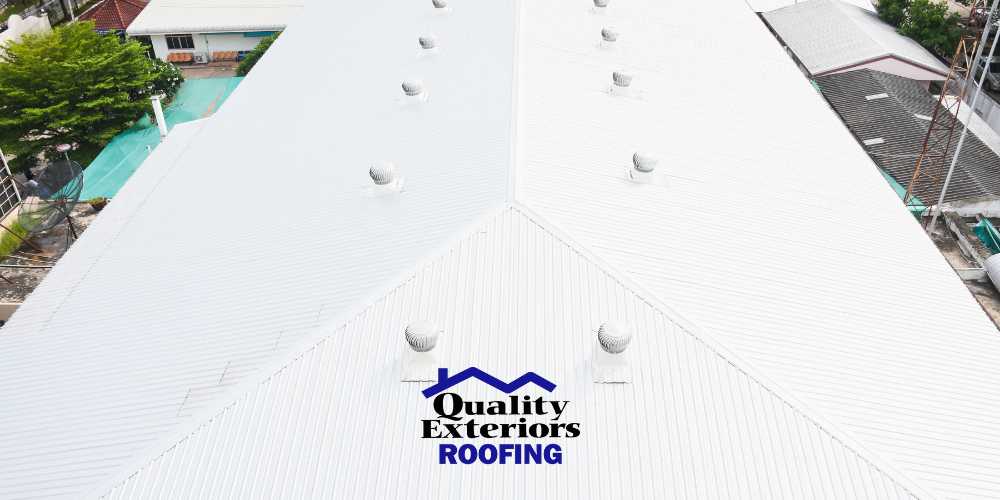
A standing seam metal roofs are another type of the flat roof systems characterized by vertical seams that run along the length of the panels. These seams are raised above the flat surface of the metal panels, creating a standing seam profile. These metal roofs are typically constructed from durable materials such as steel or aluminum, providing exceptional longevity and resistance to environmental elements.
Metal roofs with a standing seam offer exceptional durability, boasting lifespans of up to 50 years or more with minimal upkeep. These metal roofs excel in fire resistance. Additionally, standing seam metal roofs reflect solar radiation, enhancing efficiency by reducing heat absorption and lowering energy bills.
Metal roofs can be more expensive to install compared to other roofing systems due to the higher cost of materials and installation. Nevertheless, the exceptional durability, efficiency, and fire resistance make metal roofs a popular choice for flat roofing materials.
Flat Roof Repair in Bossier City
Don’t let a hail or wind damage compromise the safety and integrity of your property.
Whether you’re dealing with a roof leaking, damage from weather, or other issues, the team at Quality Exteriors Roofing in Bossier City, LA, is here. Our well-equipped professionals can provide hail damage roof repair and help with insurance claims for roof storm damage.
Flat Roof Replacement in Bossier City
Are you considering a new flat roof or roof replacement in Bossier City? QEI is your trusted partner for reliable and efficient flat roof systems, offering top-quality flat roof materials and expert craftsmanship to ensure your new roof is built to last.
If you’re dealing with aging flat roofing materials or simply want to upgrade to a more durable and energy-efficient option, we’re here to help. Don’t wait until your roof issues escalate – contact Quality Exteriors Roofing today to schedule your flat roof replacement and enjoy peace of mind knowing your property is well-protected for years to come.
Flat Roof Installation in Bossier City
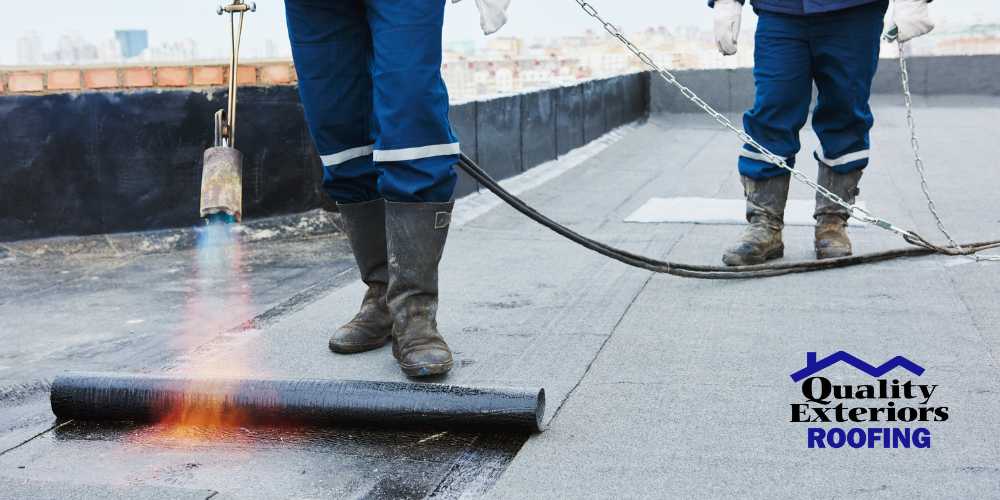
Need a new flat roof? Trust Quality Exteriors Roofing to provide top-notch flat roof installation services in Bossier City.
Our experienced team is equipped with the skills and knowledge to handle your project efficiently and effectively. With a commitment to using high-quality materials and delivering superior craftsmanship, we ensure that your flat roof installation is done right the first time.
Don’t compromise on the integrity of your property – call QEI today, and let us take care of your flat roof installation needs with precision and professionalism.
Flat Roofing Materials in Bossier City FAQ
Looking for answers to common questions about flat roofs?
What is the Best Material for a Flat Roof?
The best flat roofing materials are single-ply membranes like TPO (thermoplastic polyolefin) and EPDM (ethylene propylene diene monomer). Built-up roofing (BUR) systems and modified bitumen provide robust protection and longevity.
What is the Longest Lasting Flat Roof Material?
The longest-lasting flat roof material often depends on the location’s climate. Modified bitumen roofing and built-up roofing (BUR) systems are among the top contenders for durability. These flat roof materials boast resilience against weather elements and UV radiation, contributing to their extended lifespan.
What is Used to Make a Flat Roof?
Flat roofs are constructed using a variety of different materials, including but not limited to modified bitumen, EPDM rubber, TPO, PVC, and BUR systems. Other materials such as insulation boards, vapor barriers, roofing felt, and protective coatings are often used in conjunction with these primary roofing materials to enhance performance and durability, depending on the roof type and foot traffic.
What Sheet Material Is Used on Flat Roofs?
Flat roofs commonly utilize sheet materials for single-ply membranes like modified bitumen, EPDM rubber, TPO, and PVC flat roof membranes, providing durability, weather resistance, and energy efficiency. These sheets are installed in rolls or sheets, fastened mechanically, or adhered with adhesive, creating a seamless roof surface.
How Much Does a Flat Roof Cost?
Flat roof costs vary depending on factors like square footage, materials, and the expected service life of the system. Different materials have different price points per square foot, with some offering lower initial costs but potentially higher proper maintenance expenses.

Shreveport and Bossier City Flat Roofing Professionals
For all your flat roof system needs in Bossier City, rely on the expertise of Quality Exteriors Roofing. Our Bossier City commercial roofing specialists are committed to delivering exceptional service and lasting results.
Contact us at (318) 747-1254 to speak to a knowledgeable roofing professional in Bossier City and experience the difference of working with a trusted roofing provider.
